Publications
fp21 is building a new culture of foreign policy. Explore our publications below.
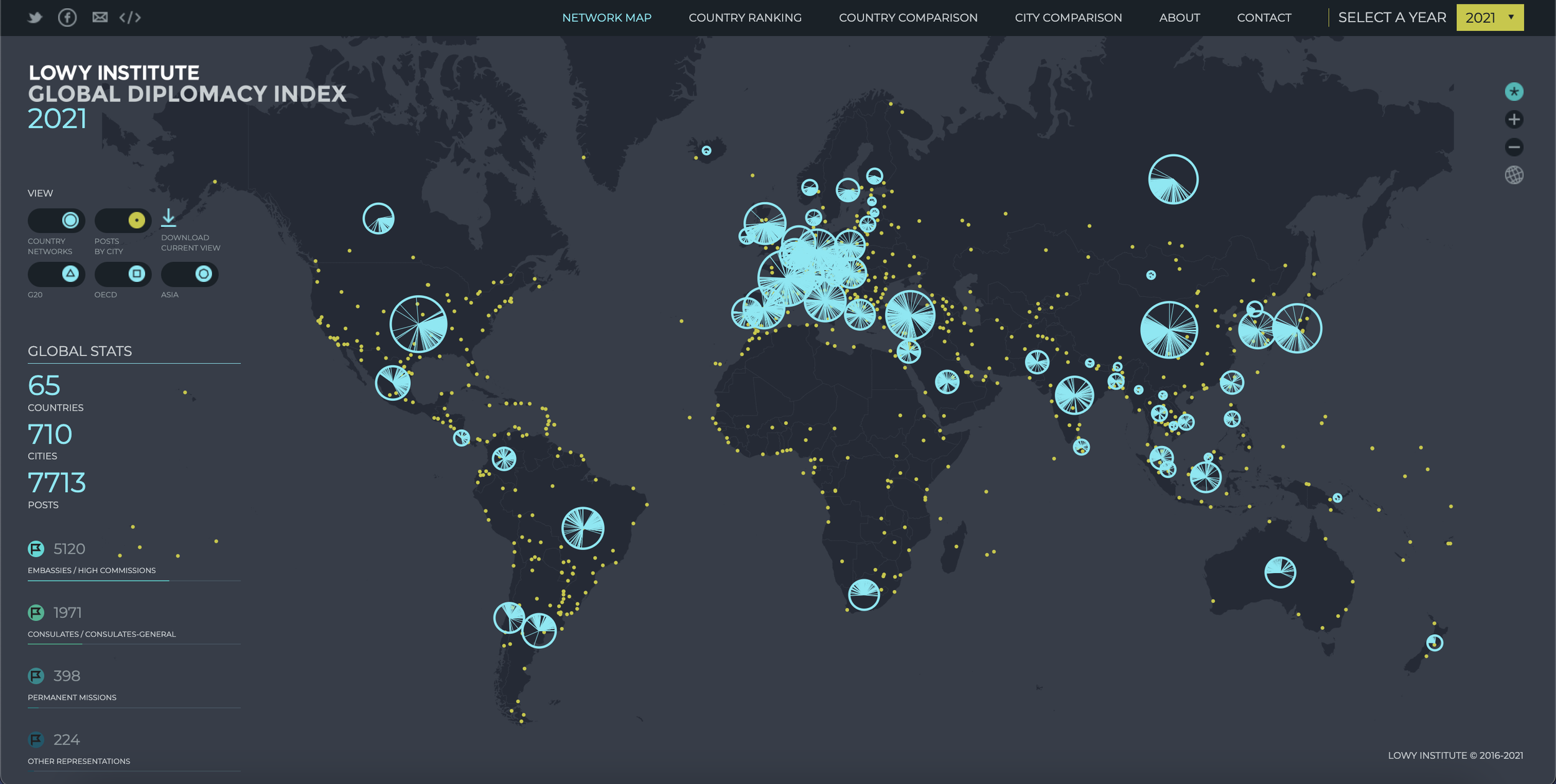
To Quantify Or Not to Quantify? Foreign Policy Needs Measurement
Toby Weed: Foreign policy establishment needs to follow the example set by other fields and incorporate quantitative measurement into its analytical and decision-making processes. By measuring the phenomena and concepts central to the work – using mathematical language to discuss them and accompanying that discussion with empirical observation – foreign policy practitioners can reduce their uncertainty and make better decisions.
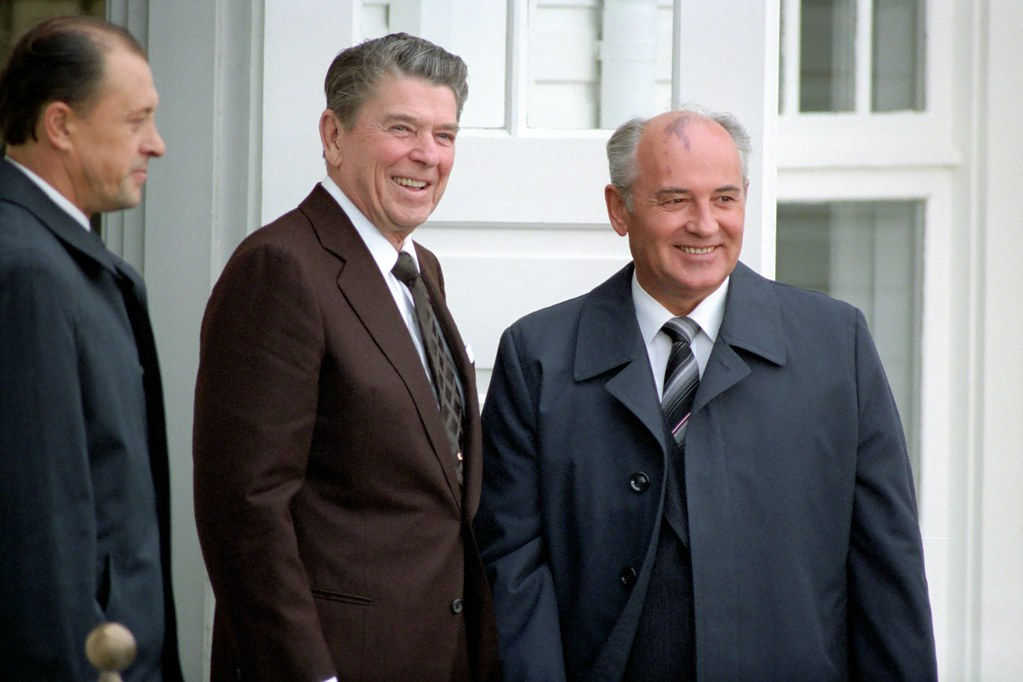
Does UNGA Matter? Examining the Research for Face-to-Face Diplomacy
Sanjana Patel: Is face-to-face diplomacy merely a symbolic practice, or does it hold unique value to meaningful shape international affairs? This article surveys evidence on the value of face-to-face diplomacy across a range of disciplines.
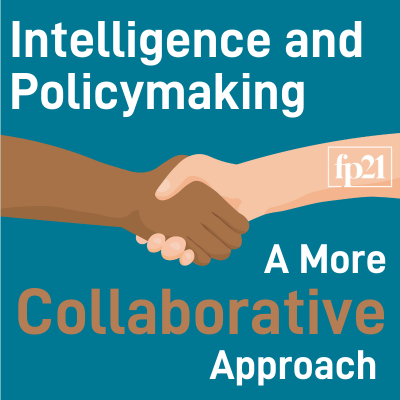
Intelligence and Policymaking: The Opportunity for a More Collaborative Approach
Gary Gomez: This paper explores the implications of a more collaborative and connected approach to intelligence analysis and policy formulation. It explores a model in which analysts and policymakers are co-located within policy offices at all levels of policymaking. The goal of this approach is to enable a better fusion of experience and knowledge to support holistic and relevant intelligence analysis and informed evidence-based foreign policy.
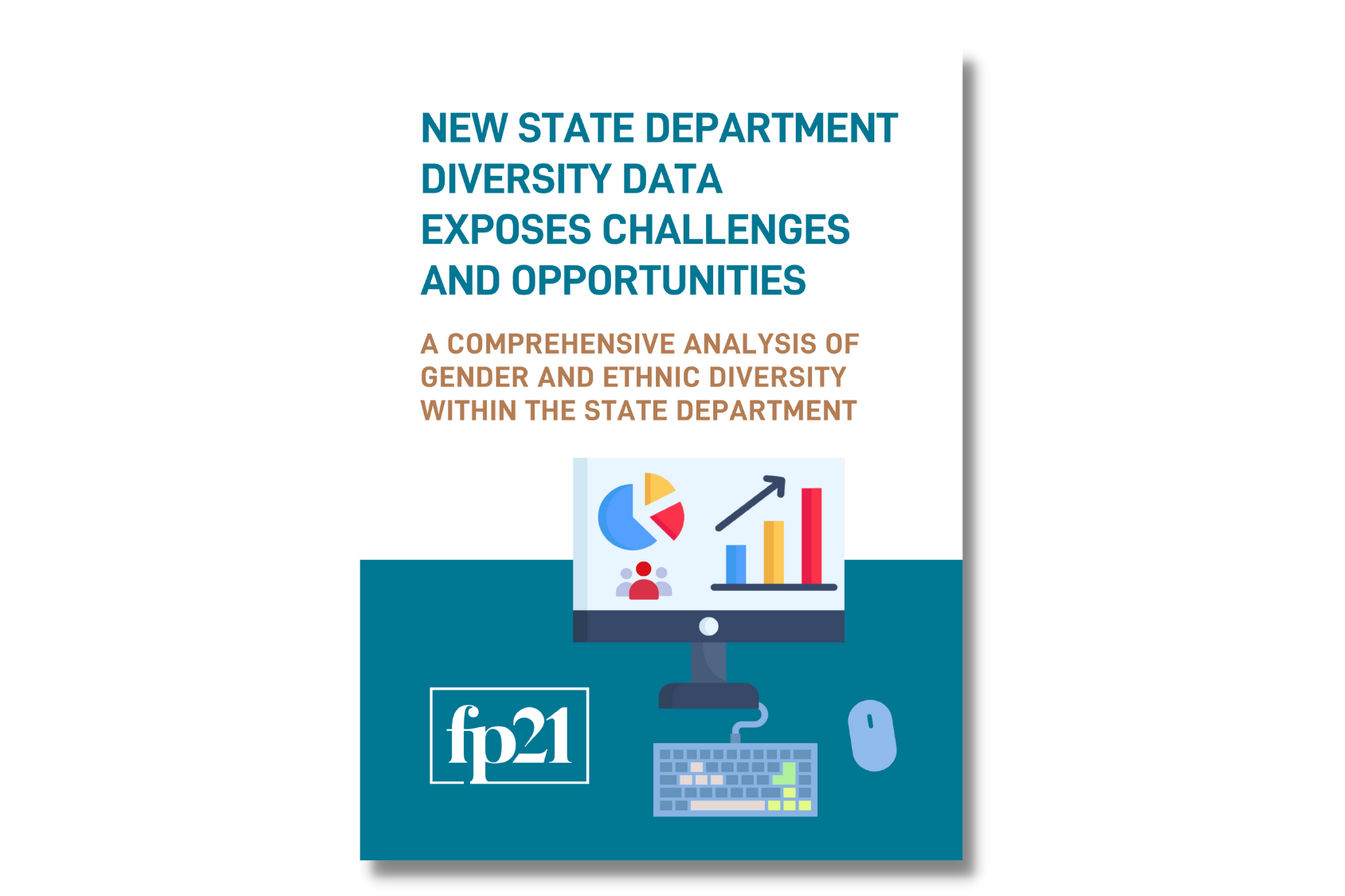
New State Department Diversity Data Exposes New Challenges and Opportunities
Ellice Huang, Thomas Scherer, Vic Marsh, & Dan Spokojny: How diverse is the State Department? Recently released State Department demographic statistics leave much to be desired. fp21 helps fill this gap by using sophisticated data science tools and archival information to examine representation in American diplomacy.

Teaching Data-Driven Decision-Making
Dan Spokojny: Last week Dan finished teaching a course on “Data-Driven Decision-Making” for a White House-led initiative called the U.S.-ASEAN Institute for Rising Leaders at the Johns Hopkins School of Advanced International Studies. The top-line argument for the course was to use the best available evidence to make the best possible decisions.

Evaluating Policy Success and Failure in Foreign Policy: A Better Approach
Thomas Scherer: When is a foreign policy a success, and when is it a failure? Most commentators fail to specify criteria or offer good evidence to support their claims. As with any scientific endeavor, clear standards of success are essential to policy learning, innovation, and improvement. This article offers three rules to follow to improve our understanding of policy success.
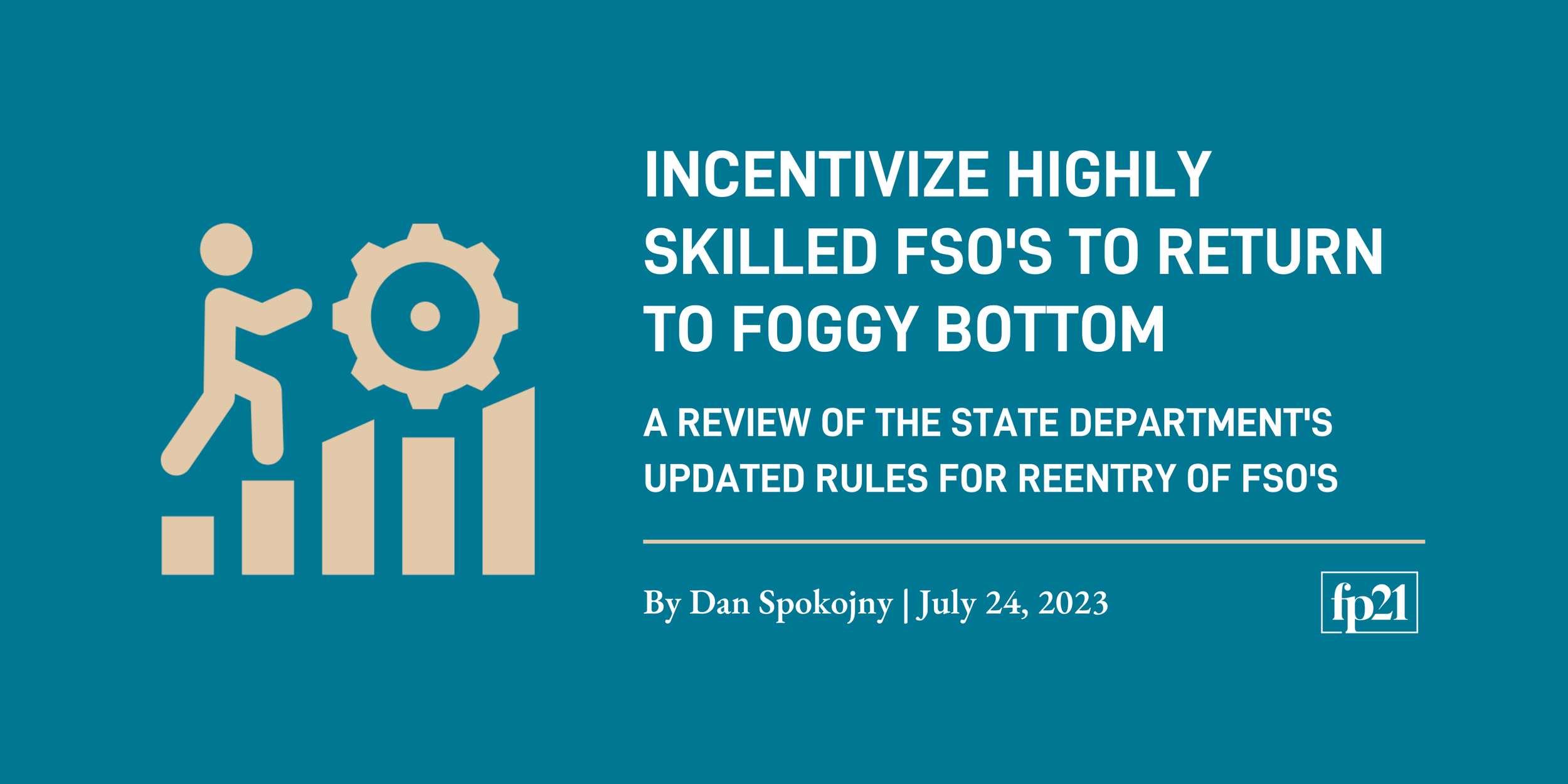
Incentivize Highly Skilled FSOs to Return to Foggy Bottom
Dan Spokojny: The State Department recently announced updated rules for the reentry of recently departed Foreign Service Officers. Many would jump at the chance to return to the Department if empowered to apply their new leadership, technical, and substantive skills. Greasing the skids for talented officers to return to Foggy Bottom would energize Secretary Blinken’s modernization agenda and set diplomacy on a better path into the future.
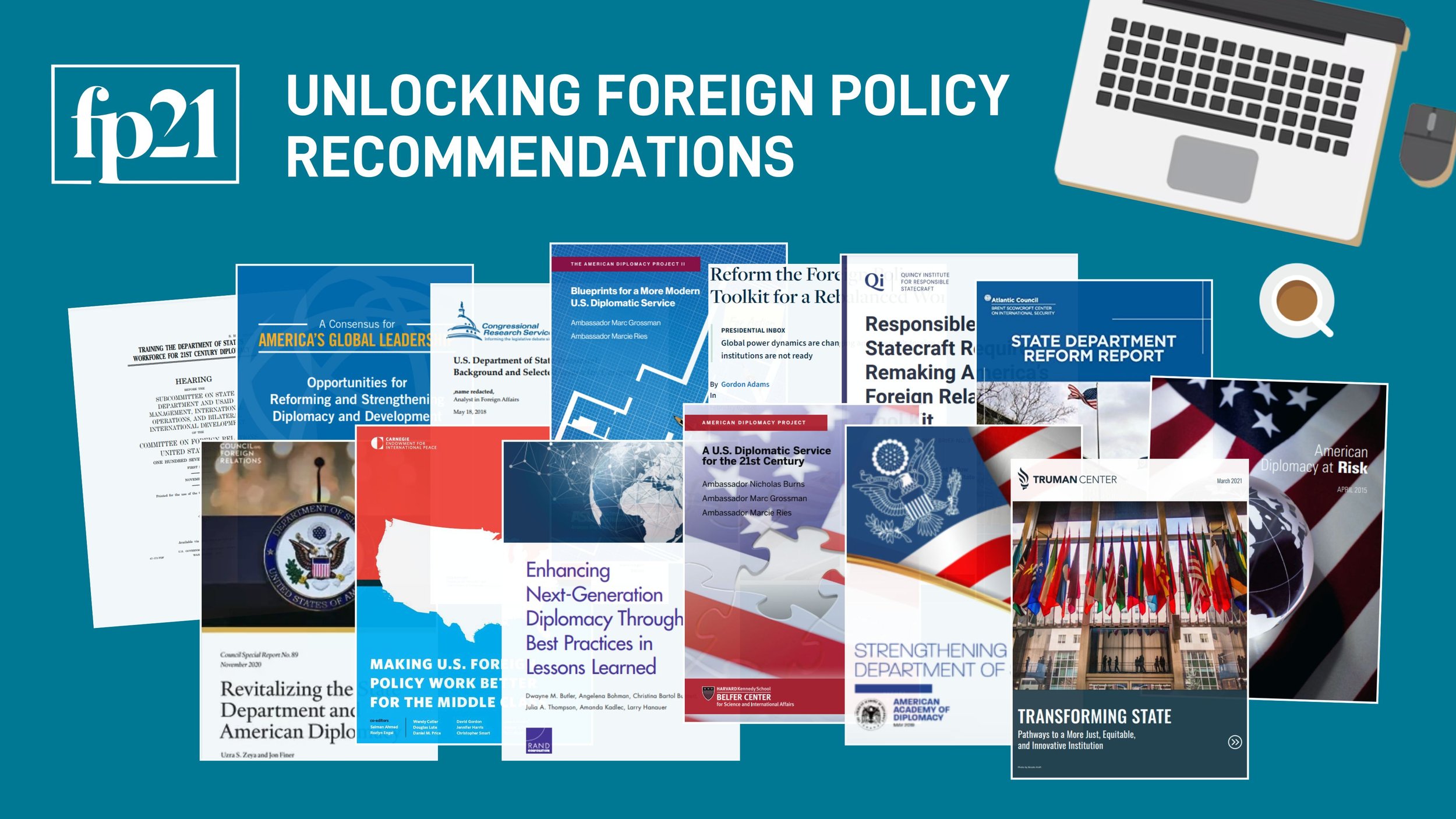
Unlocking Foreign Policy Reform Recommendations
Thomas Scherer, Toby Weed, & Marisa Jurczyk: There is an abundance of reports with recommendations for how to improve U.S. foreign policy. These recommendations help us understand how foreign policy has evolved and where it can go, but that information is hard to distill. We unlock this knowledge using computational social science techniques, with promising results.
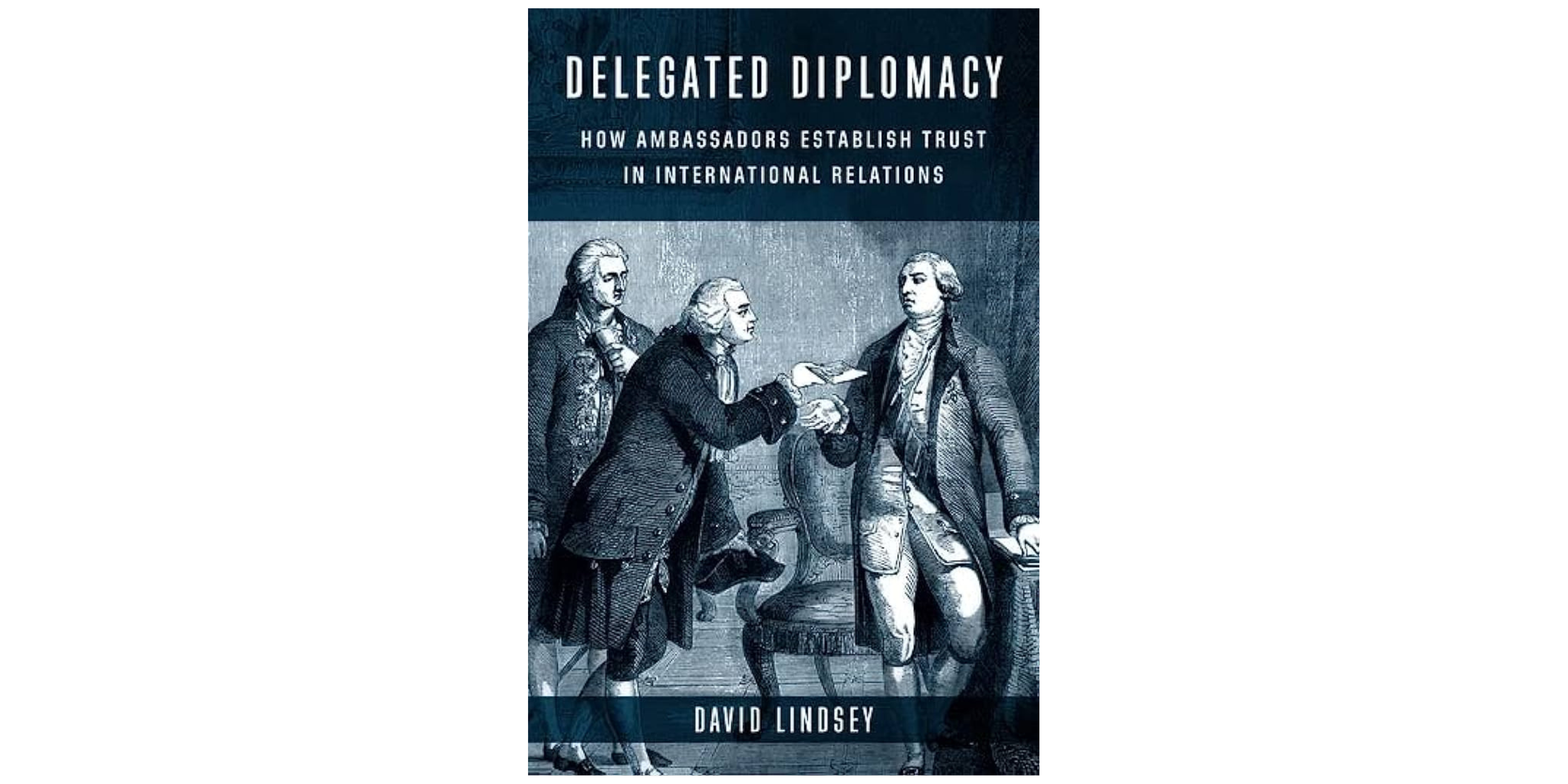
A Review of ‘Delegated Diplomacy: How Ambassadors Establish Trust in International Relations’
Dan Spokojny: When presidents and leaders can communicate directly and instantaneously with one another, why bother with diplomats? David Lindsey's new book offers a counterintuitive but compelling answer. This book review examines the compelling argument which demands that we take the role of diplomats more seriously.
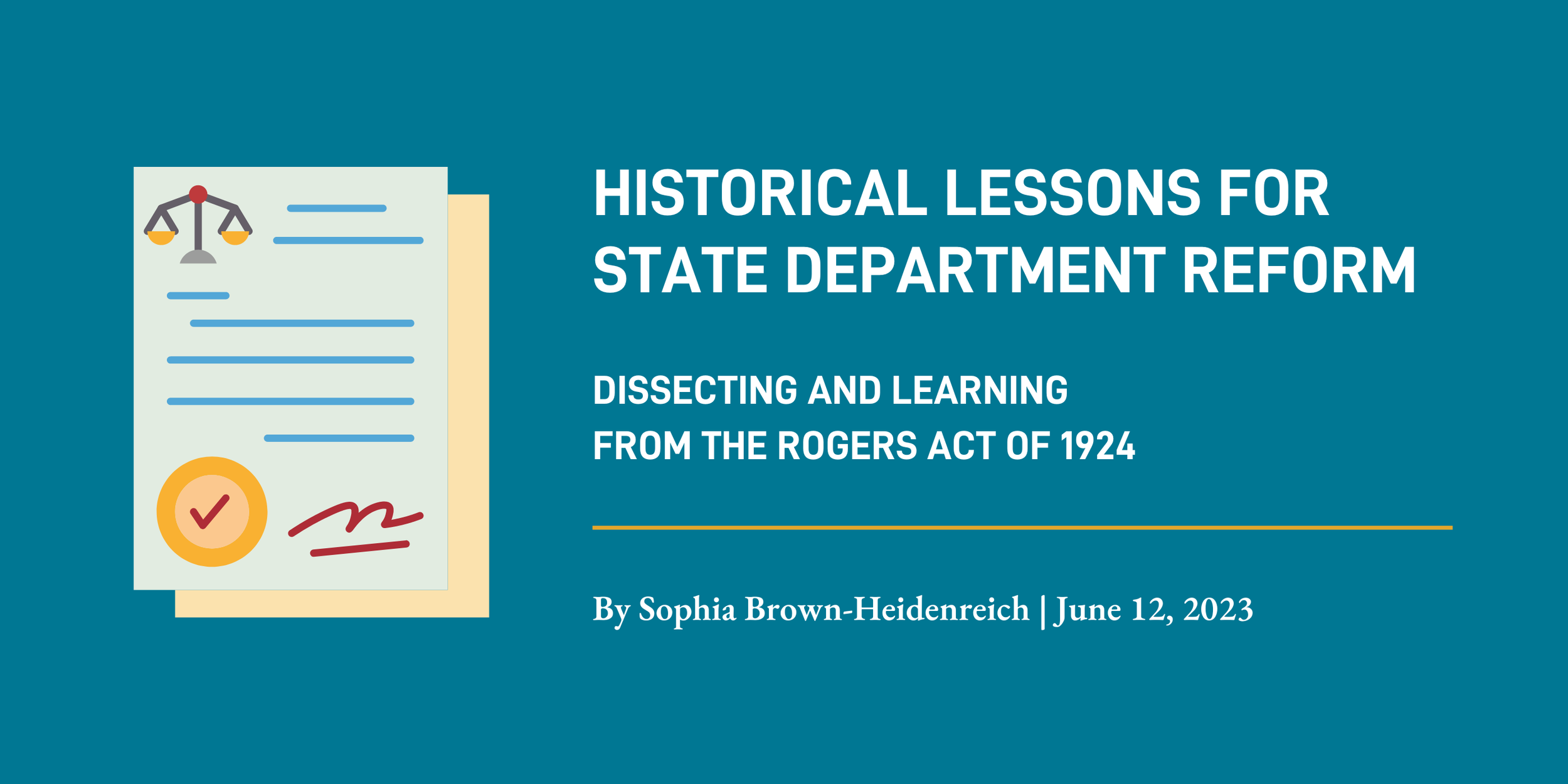
Historical Lessons for State Department Reform
Sophia Brown: The Rogers Act, which turns 100 next year, paved the way for the American diplomatic service to become the world’s most influential. Yet many of the problems that the Rogers Act sought to address a century ago have reawakened in today’s State Department: struggles with meritocracy, worrisome politicization, and a siloed personnel system. The history of the Rogers Act offers lessons for how today’s reformers may succeed or fail.

Bridging the Gap to Nowhere?
Dan Spokojny: “Bridging the gap” between academics and policymakers is vital for improving US foreign policy. Yet there are some critical design flaws in the bridge that need to be addressed. It's worrying when scholars must hide their methods and evidence when speaking with a policymaker. This risks placing outstanding scholarship on equal footing with opinions, lobbying, and misinformation.

ISA2023 Roundtable Summary: Can Foreign Policy Decision-Making Be Made More Scientific?
Thomas Scherer: Top State Department officials maintain that diplomacy “is not a science.” But experts convened by fp21at the 2023 International Studies Association Convention largely affirmed that foreign policy can and should be more scientific.

How AI Could Revolutionize Diplomacy: From ChatGPT to quantum computing, emerging technologies will offer new tools for peacemaking
Andrew Moore: With advances in areas such as artificial intelligence, quantum computing, the internet of things, and distributed ledger technology, today’s emerging technologies will offer new tools and techniques for peacemaking that could impact every step of the process—from the earliest days of negotiations all the way to monitoring and enforcing agreements.
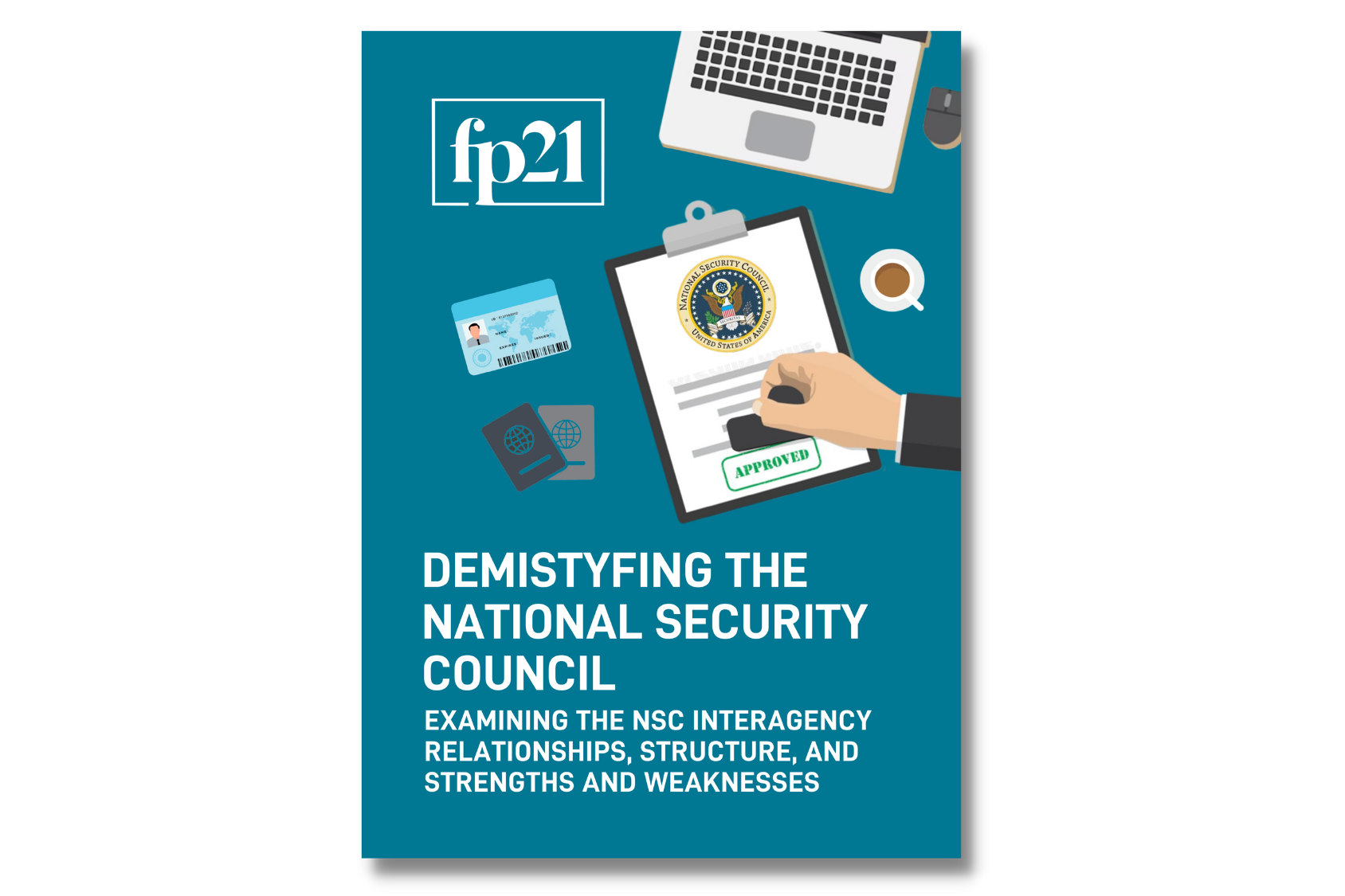
Demystifying The National Security Council: Examining the NSC interagency relationships, structure, and strengths and weaknesses
Alexandra Blum: Born in 1947, the National Security Council has become the central forum for shaping US national security. The NSC presents a vital case study of foreign policy reform given its constant evolution. This report unpacks how the NSC operates, who wields decision-making power, and how fourteen successive presidents have adapted it to respond to the priorities at hand. Understanding the NSC is foundational to recommending calibrated reforms for the rest of the national security apparatus.
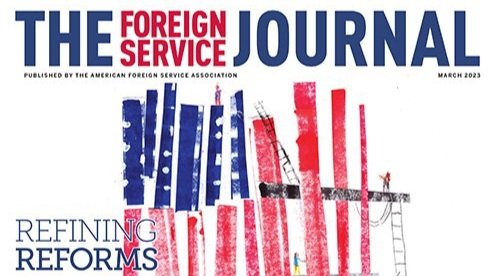
From Instinct to Evidence in Foreign Policy Decision-Making
Dan Spokojny: The modernization of the State Department and the return of diplomacy to its rightful place in the U.S. national security infrastructure—on top—will require more than small tweaks at the margins. Blinken’s modernization initiative is commendable, but more is required.
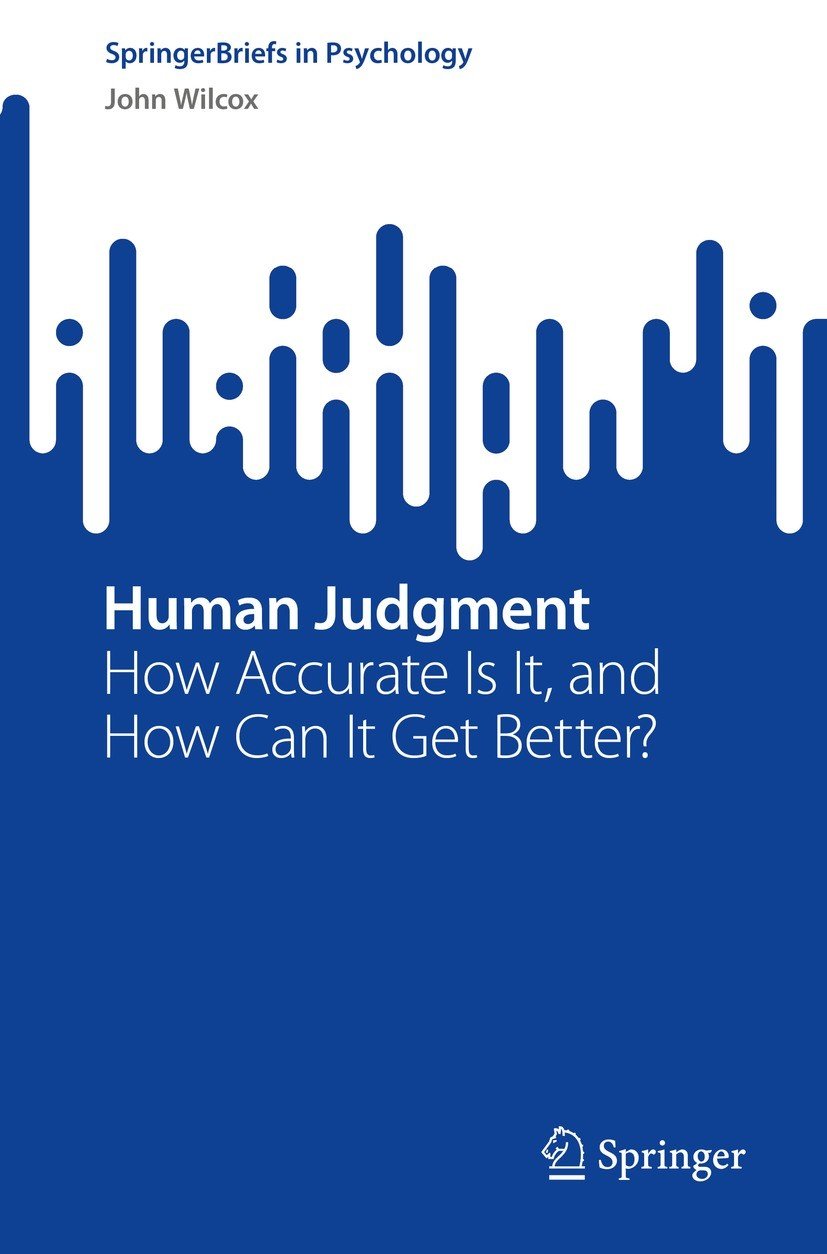
Human Judgment: How Accurate is it, and how can it get better?
fp21 researcher and Stanford cognitive scientist, Dr. John Wilcox, publishes a new book, “Human Judgment.” The book concerns two topics to do with human judgment: How accurate is it, and how can it get better? Two noteworthy implications emerged from the research: one pessimistic, and one optimistic…

Forecasting in Policymaking: Beyond Cassandra
Dan Spokojny: All policy decisions are built on assumptions about the future. Yet many of the assumptions underlying policy pronouncements remain ambiguous and under-evaluated. Formalizing these assumptions can allow us to test the quality of our policy process and potentially improve its effectiveness. This post develops and evaluates four models for integrating forecasting methods into the policymaking process.
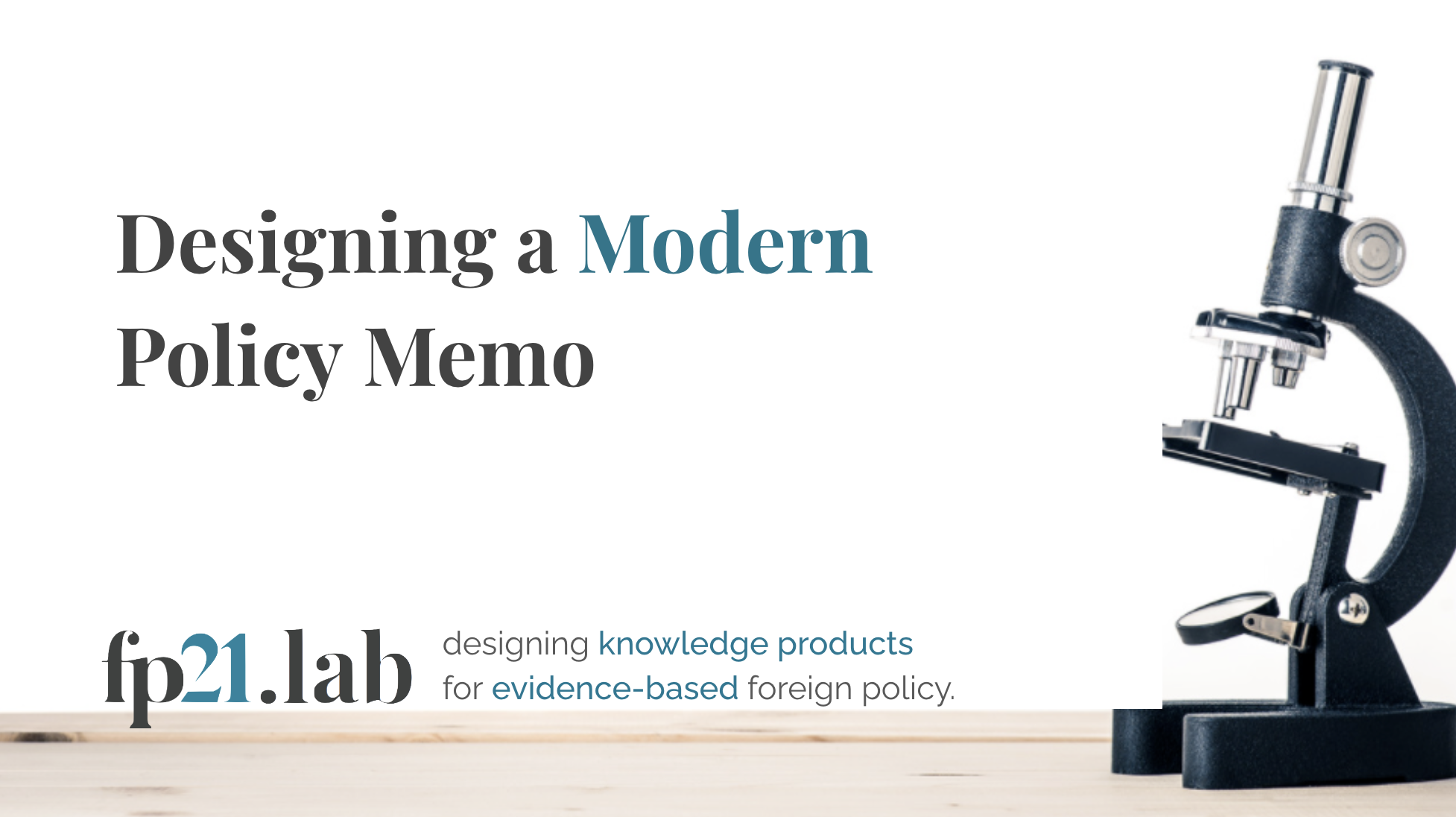
The Bayes Brief: Designing a Modern Policy Memo Process
Alex Bollfrass & Ellice Huang: Respected State Department observers complain that “clearance hell” weakens American diplomacy. The Bayes Brief re-imagines the humble policy memo and clearance process by capturing and summarizing evidence in a systematic format conducive for policy success in the information age. It is a simple intervention into the policy process that could positively impact the effectiveness of U.S. foreign policy.
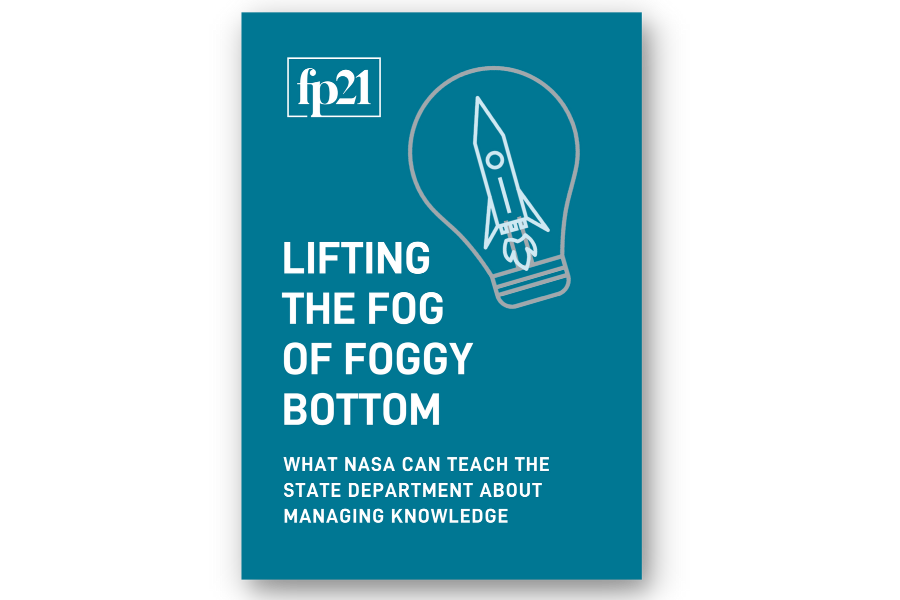
Lifting the Fog of Foggy Bottom: What NASA Can Teach the State Department about Managing Knowledge
This report explores how knowledge management can transform diplomacy. By prioritizing knowledge as its most important strategic resource, the State Department can make more effective policy, improve productivity, and build a learning-centric culture.

Congress Orders Changes for State Department in New Authorization
Dan Spokojny: The new State Department Authorization recently passed by Congress and signed into law by President Biden includes some meaningful changes for diplomacy and international relations. The legislation advances new authorities and requirements across training, workforce issues, hiring and promotions, and internal security issues. Let’s take a closer look:

